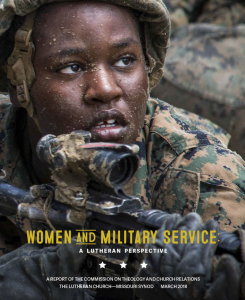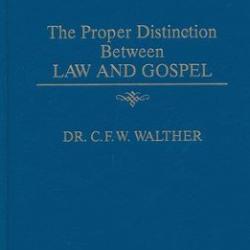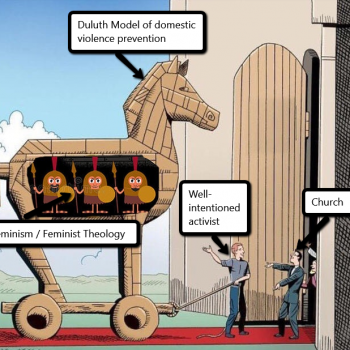+++
Should women serve in combat roles in the military?
In our country, a definitive answer was given not even 3 years ago. Around that time, Chronicles magazine article editor Aaron Wolf wrote:
“December 3 [2015 was] the day Secretary of Defense Ash Carter declared an end to the restriction on women in combat. According to the secretary, every branch of the Armed Forces must lift all restrictions on what women are allowed to do. He gave them 30 days to comply.
Ash Carter is a Harvard-trained physicist, former advisor to Goldman Sachs, and professor who never wore his country’s uniform, so it makes perfect sense that he would be the man to build ‘America’s force of the future,’ a job that amounts to taking the stone tablets of natural law and smashing them into a million pieces.
We must now drink the bitter water…” (bold mine)

This question was brought up at the 2004, 2007, and 2010 Lutheran Church—Missouri Synod conventions[i] and in both the 2013 and 2016 conventions resolutions were adopted which tasked the Synod’s CTCR (Commission of Theology and Church Relations) to study and produce a report on the topic. Finally, in 2018, a document was released, and I want to lead with statements from it that I really appreciated:
- “By the means of Mary’s embodiment as a woman, and our Lord Jesus’ embodiment as a man, the whole of humanity, both male and female, plays a role in nothing less than the salvation of the world. If God Himself gives such dignity to man and woman, then each of us, whether male or female, is also called to live within his or her individual, sexual personhood, uniquely, yet toward God’s own eternal purposes within the tapestry He has woven” (21).
- A footnote notifies us about “a strong and compelling argument against the conscription of women rooted primarily in convictions regarding the sanctity of human life from the moment of conception, see Andrew A. Sicree, “A Miscall to Arms: Why Selective Service for Women is Immoral,” Touchstone (September/October 2017), 55–58.”
- A footnote notifies us about: “a 1998 resolution by the Southern Baptist Convention opposing women in combat cites Eph. 5:23–24 as a key passage in demonstrating ‘the divinely assigned role and responsibilities of self-sacrificial male headship of the family’ [emphasis added] and explicitly connects this to ‘the moral justification for combat service by men rather than women.'” (See sbc.net/resolutions/1089.)” (10).
- “As 2016 Res. 5-11A rightly observes, reason and natural law recognize physical, hormonal and emotional distinctions between men and women. On average, males have greater physical strength than females, particularly upper body strength. Additionally, due to differing hormonal concentrations, males typically have higher aggression levels, and females have greater tendencies toward nurturing, supporting others and developing or building relationships. Furthermore, some men may have protective attitudes toward women that could cause unit and mission risk if women are involved in combat units. Studies have shown that all-male combat units perform significantly better than integrated combat units. They also reveal that women have significantly higher attrition rates due to injuries in combat-related situations… While the death of any soldier is deeply tragic, and while both fathers and mothers play a crucial role in the family, reason and natural law recognize the likelihood (even certainty) that the loss of significant numbers of women in combat would negatively affect the morale not only of soldiers and the military but of society as a whole. Perhaps this is one of the reasons why the witness of world cultures, both ancient and modern, is almost unanimous in maintaining a prohibition against women serving in combat” (13).
Getting into the heart of why the document finally made its appearance now — after so many years of discussion — here is a paragraph that I think gets to that, namely, the threat of women being drafted[ii]:

This document has been prepared by the CTCR in response to these 2013 and 2016 resolutions of the Synod. The moral question of whether a society or a government should conscript women or employ them in combat is an important one. In view of the American social, political and legal context — especially in view of very recent decisions opening all combat roles to women and recent legislative discussions regarding the possibility of requiring Selective Service registration for women as well as men — the primary focus of the present study is on the moral deliberation of women who are serving in or contemplating service in the military, or who could potentially face registration for or conscription by a military draft. (4)
As to the wider question of whether women should voluntarily serve in combat roles, the document says that this is a matter of the individual Christian women’s conscience. In the document’s third part, addressing practical matters, it states:
Those women who are not conscience-bound against women serving in combat and who desire to serve in a combat specialty within the armed forces should evaluate their motives and physical qualifications for desiring to serve in this vocation. Some questions may include:
- Can I faithfully and conscientiously bear witness to my faith in Christ and my unqualified commitment to “live under him in his kingdom” (Luther’s Small Catechism, Explanation of the Second Article) in and through the left-hand kingdom vocation of military service?
- Is this service or vocation sought out of love for God and my neighbor and not simply or primarily for self-interest or career advancement?
- Am I physically, mentally and emotionally qualified for this specific service?
- Am I prepared for the greater potential for sexual assault and/or harassment that exists for women in military service?
- Can I, in good conscience, willingly participate in training that prepares me to take human life?
- How might such service affect others whose consciences are troubled by this issue?
- Do I have other vocations that would be affected by such service, particularly as a wife and mother?
Pastors should be prepared to provide counsel to their parishioners as well as to others who come to them regarding God’s Word and matters of conscience” (19).

Going along with this, one reads the following:
“A Christian woman (married or not) may come to the conscience-bound conviction that what Scripture (together with reason and natural law) says about the order of creation, while completely valid and true, is not decisive on the issue of women in combat. Reasons for arriving at this conclusion might include the fact that scriptural discussions of this issue are primarily concerned with the role of women in marriage and the family and with order in church, and that Scripture does not make explicit every implication or application of the order of creation for life in the civil estate (including service in the military)” (16).
“A Christian woman (married or not)” – why does this not just say “a Christian”? The reason, as the following paragraphs make clear, is because the person’s conscience who matters here is the one whose potential military service is under discussion.
And as Lance Brown pointed out in his own raucous article on this topic, published on my own blog yesterday, this does leave one scratching one’s head about the place of male headship in a marriage…. The document does talk about the conscience of a woman who is a wife or mother being bound “against her service in the military,” a potential reason being, for example, her husband’s disapproval (16). That said, I think it is safe to say that the document itself would not think to attempt to bind her conscience without such an obstinant husband in view! Or, especially, to seek to create so many more obstinant husbands…[iii]

And that might make Pastor David Wollenberg, for one, happy. In the May 2003 Lutheran Witness, Wollenberg spoke of the reasonableness of women in combat, stating that, in part, for the Christian, “[t]he service of women in combat is a civil matter, and discussions pro and con properly belong to the civil and political realm!” and saying that “this is not an issue either of church polity or theology.”[iv] In his same article, Wollenberg stated that: “let’s also recognize and give thanks for the fact that ours is not an immoral or unfeeling government. The United States military respects individual rights even as it encourages human excellence and advancement.”
Perhaps this was wrong of me, but I could not help to think here about something else the CTCR document had spoken of, which was that those who argue for women in combat point out what they often consider the following violation of individual rights:
“As combat duty is usually regarded as necessary for promotion to senior officer positions, denying female personnel this experience ensures that very few will ever reach the highest reaches of the military and so further entrenches sexism. Women have to be given the same opportunities as men in the army; in order to have the same opportunities, they have to be exposed to the same risks. (3)
Even if one agrees wholeheartedly that military service should not be sought out “simply or primarily for self-interest or career advancement,” as the CTCR document says[v], we still cannot be unaware of the fact that as with all areas of life, advancement up “hierarchies of competence” will always be a reality that we cannot avoid thinking about or living in light of. We can perhaps casually dismiss Warren Farrel’s argument about how “the pressure on men to succeed is actually a discrimination against men,” (that’s not very manly of you Warren!) but to be sure, now women can – in many a situation at least – find themselves increasingly valued primarily for what they are able to accomplish, push through, sell, and destroy in the dog-eat-dog world.[vi]
In that same issue of the Lutheran Witness where Wollenberg’s article appeared, Dr. Leroy E. Vogel, a retired U.S. Navy chaplain and professor emeritus at Concordia Seminary in St. Louis, Missouri, also presented an alternative view. He wrote the following:
“At the very least, before a woman embarks upon a role as military combatant, she should consider this: If God is indifferent to the woman-warrior concept and a woman chooses to serve in a non-combatant role, God is not offended. If, however, God is not indifferent to the woman warrior concept, and a woman seeks service as a combatant, does she not become a victim of her own will and disobedient to that of God?
The stakes appear to merit the expenditure of our church’s finest and most diligent theological efforts.”

As Vogel pointed out even then, “ignoring the Biblical account of creation, radical feminism identifies sexual differentiation and roles as social constructs, and, if society has created the distinctions, society can abolish them.” One can tell from the questions that he asked in his article, that he wasn’t having any of this:
“Is not part of woman’s “glory” to be found in her God-given role as life-giver and nurturer—not as life destroyer? Is man’s role not to protect and nourish her in that glorious role? Does not the abandonment of the arrangement established in Eden fly in the face of God’s design for His creation?”
While acknowledging that there does not exist a definitive “proof text”[vii] (wait! I thought we weren’t supposed to be obsessed with proof-texts!), Vogel says “Scripture and the tradition of the Church assign to man the role of defender, protector, warrior. To woman is given the role of life-giver, nurturer, sustainer.”

Going too far? Well, if one doesn’t want to be an unsophisticated and barbaric asserter, like moi, you can always take refuge in practical arguments that continue to hold up (even if they are always ignored nowadays). My guess, however, is that most of us won’t even do that much, but rather allow ourselves to be lulled to sleep, comforted in the fact that “the United States is not the only country moving to include women in combat roles. Other countries include Australia, Canada, Denmark, Finland, France, Germany, Norway and Poland” (footnote, p. 18).
On the other hand, maybe — given the entire history of the world up until seven seconds ago — the Apostle Paul should be our guide instead:
“Likewise, teach the older women to be reverent in the way they live, not to be slanderers or addicted to much wine, but to teach what is good. 4 Then they can urge the younger women to love their husbands and children, 5 to be self-controlled and pure, to be busy at home, to be kind, and to be subject to their husbands, so that no one will malign the word of God” (Titus 2:4).

To close, when the CTCR says:
“…it is also possible to understand how Christians, including members of the LCMS, can in good conscience support and defend ‘the informed consciences of women who have carefully considered their station in life and Holy Scripture on this issue who wish to voluntarily serve in our nation’s military’ (2016 Res. 5-11A), even when this may include serving in positions of combat” (14).
I can only say:
No. It’s not understandable. Not at all. Its deeply confused and wrong.
In fact, as they rightly point out elsewhere:
“[some] cultural and societal changes…. have been decidedly negative from a Christian perspective, contributing to a continual blurring of the lines between any meaningful, created, God-given distinction between the sexes and chilling the possibility of discussing, expressing and affirming the God-given distinction between men and women in ways that are heard and received positively and constructively” (7).
Of course, “chilling the possibility of discussing… in ways that are heard and received positively and constructively” may well be what some people say about this article. Nevertheless, we need to be painfully honest with ourselves. This CTCR document, like so many other things the LC-MS has been producing these days, just needs to go away.

Far away.
On the other hand, come quickly Lord Jesus!
FIN
Images:
Aaron Wolf: https://www.chroniclesmagazine.org/blogs/aaron-wolf/ ; Pastor Leroy E. Vogel: https://www.csl.edu/emeritus-faculty/vogel-leroy-e/
Notes:
[i] “Overtures directed specifically to this issue were formally submitted to the Synod in convention in 2004, 2007 and 2010, but no resolutions on this matter were adopted by the assembly.” (p. 3)
[ii] As the CTCT document logically points out: “Third, now that the ban on women serving in combat has been lifted, there is no evident legal rationale for exempting women from conscription into military service should registration for Selective Service be required at some point in the future” (7).
[iii] My guess: it is only a matter of time before we hear about how it is inappropriate that a person other than the woman herself object to her being conscripted…
[iv] Speaking of Ephesians 5, the CTCR also talks about how this has nothing to do with political realities: “Under the principle of mutual service, however, hierarchy within marriage is viewed not as a political relationship of the ruler over the ruled but as an arrangement whereby the welfare of the other may be served. The Christian husband will therefore understand that the position of headship has been entrusted to him for the exercise of sacrificial love toward his wife …” (11)
[v] Also, it quotes Chaplain Jonathan Shaw, a colonel in the U.S. Army: “The Christian undertakes such service not for the sake of wielding power or seeking revenge, but ‘for the good of your neighbor and for the maintenance of the safety and peace of others’” (6).
[vi] Or, as one Facebook commentator put it to me “Send the women to the meat grinder; and when their swollen rotting corpses and unrexognizeable faces populate the earth in the next world war, we can all rejoice, knowing that women are expendible, just like men, and that the relative value of men to women on the dating scene back home has not changed.”
[vii] Nevertheless, he writes the following:
“While some may view it as a shaky premise upon which to hang the will of God, there is a curious Hebrew interpretation of Deut. 22:5 that is rendered in the New International Version: “A woman must not wear men’s clothing … for the Lord your God detests anyone who does this.”
A prohibition against cross-dressing? Or is there more? The construct of import is the compound noun keli-geber, translated above as “men’s clothing.” In Hebrew, keli denotes “equipment,” specifically a soldier’s equipment. Further, the Hebrew noun geber denotes “mighty man” or “hunter” or “warrior.” Thus, a legitimate translation of the phrase uses language of a decidedly military flavor: “No woman shall put on the gear of a warrior.”
The church fathers understood it so, as did John Calvin and Martin Luther. Luther knew Hebrew and comments on the verse as follows: “A woman shall not bear the weapons of a man … it is improper….Through this law [God] reproaches any nation in which this custom is observed.” Why? Because God created male and female with specific and complementary characteristics. It is in their relationship with one another that the two constitute the full expression of humanity.
The CTCR simply introduces more questions with its own choice of words: “In fact, the Old Testament directives in this regard extend beyond military garments and include every kind of domestic clothing as well as use of other utensils (Ex. 22:6 [stacked grain]; Lev. 11:32 [garment, skin or sack]; Lev.13:49 [garment or skin])” (12). I think the portion of that statement I italicized above is just begging to be unpacked a little bit.
The CTCR also notes that “in the historical books of the Old Testament, male armies abound, and there is never any suggestion of women serving as combatants (Gen. 14:14–15; Num. 31:3, 21, 49; Deut. 20:5–8; Judges 7:7; 1 Sam. 23:8–37; 2 Chron. 17:10–19). Even heathen armies did not include women (1 Sam. 4:9–10). The idea of women serving in combat was used as an object of ridicule (Nah. 3:13; Is. 19:16; Jer. 51:30). Women and children were specifically excluded from combat (Deut. 3:19–20; Deut. 20:13–14; Josh. 1:14–15)” (12).












